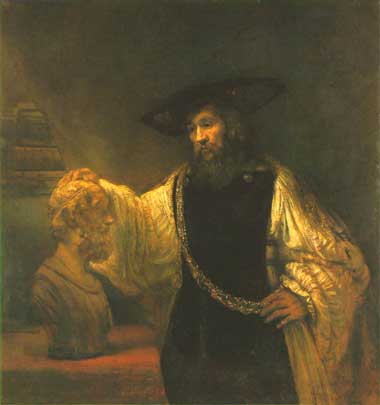|
|
Aristotle contemplating the bust of Homer, ) at PP) Poetry uses different mediums, objects and modes in order to carry out an imitation. The Medium, Object and Mode of Poetry Poetry has a medium, object and mode. Aristotle gives some examples of medium: color and shape (Poet.1447a20 () at PP), harmony and rhythm (Poet.1447a27 () at PP), metered and un-metered speech (() at PP). The object of poetry can be a certain kind of person with a certain kind of character. This character can be "either of stature or inferior." Poet.1448a2 (http://www.perseus.tufts.edu/cgi-bin/ptext?lookup=Aristot.+Poet.+1448a2) at PP The mode of poetry determines how the poem is delivered and by whom. One can deliver a poem like a bard telling the story of the Iliad using different voices, or tell a story using only one, or have lots of different imitators imitating different people as in a play. (1448a23-25) The Two Causes of Poetry Poetry is caused either by imitation and/or melody and rhythm. Poet.1448b5 () at PP When Aristotle discusses the causes of poetry, he notes that poetry improved through improvisation and gradual innovation. The Three Genres of Poetry Poetry can be divided into three genres: tragedy, comedy and epic verse. ) at PP. Aristotle merely points out how Greek tragedy evolved and then came to a resting point where it no longer underwent any changes. He brings up the innovations in theater that Aeschylus and Sophocles introduced as examples. ) at PP Although it is not quite clear what Aristotle means by inferior, we do know that he uses the word as an adjective for character. Comedians imitate those of an inferior character, whereas tragedians imitate those better than us. Epic Verse Epic is the same as tragedy except that epic "uses one verse-form alone, and is narrative." Poet.1449b5 () at PP Links ) at PP (entire text in Greek and English, trans. by William Hamilton Fyfe) Free eBook of The Poetics of Aristotle, translated by Samuel Henry Butcher (http://www.gutenberg.org/etext/1974) at Project Gutenberg Retrieved from "http://en.wikipedia.org/ "
 |
|
|||||||||||||||||
